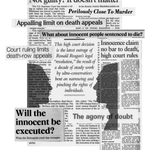DPIC Database: Innocence Database
A Death Penalty Information Center database of every death-row exoneration since 1972.
DPIC Analysis: Causes of Wrongful Convictions
The Most Common Causes of Wrongful Death Penalty Convictions: Official Misconduct and Perjury or False Accusation
Overview
Given the fallibility of human judgment, there has always been the danger that an execution could result in the killing of an innocent person. Nevertheless, when the U.S. Supreme Court held the administration of the death penalty to be unconstitutional in 1972, there was barely any mention of the issue of innocence in the nine opinions issued. Although mistakes were surely made in the past, the assumption prevailed that such cases were few and far between. Almost everyone on death row was surely guilty.
However, as federal courts began to more thoroughly review whether state criminal defendants were afforded their guaranteed rights to due process, errors and official misconduct began to regularly appear, requiring retrials. When defendants were now afforded more experienced counsel, with fairly selected juries, and were granted access to scientific testing, some were acquitted and released. Since 1973, 200 former death-row prisoners have been exonerated of all charges related to the wrongful convictions that had put them on death row.
At Issue
It is now clear that innocent defendants will be convicted and sentenced to death with some regularity as long as the death penalty exists. It is unlikely that the appeals process—which is mainly focused on legal errors and not on factual determinations—will catch all the mistakes. Reforms have been begrudgingly implemented, increasing both the costs and the time that the death penalty consumes, but have not been sufficient to overcome human error. The popularity and use of capital punishment have rapidly declined as the innocence issue has gained attention. The remaining question is how many innocent lives are worth sacrificing to preserve this punishment.
What DPIC Offers
DPIC has led the way in highlighting the issue of innocence. Its list of exonerated individuals is presented in a searchable database, with links to more complete descriptions of each case. DPIC has issued a series of reports on this issue, collecting the latest information on why so many mistakes occur. It also follows the related questions of whether innocent individuals have already been executed and whether some defendants are in fact innocent, despite not being completely exonerated in the eyes of the law.
News & Developments
News
Sep 24, 2024
Missouri Supreme Court and Governor Reject Innocence Claims and Refuse to Pause Execution for Marcellus Williams

On September 23, 2024, the Missouri Supreme Court heard oral arguments on the joint motion by Marcellus Williams’ legal team and St. Louis County Prosecuting Attorney (PA) Wesley Bell to overturn a lower court’s decision rejecting Mr. Williams’ appeal. Later the same day, the state supreme court unanimously denied the motion, stating that there was “no credible evidence of actual innocence or any showing of a constitutional error undermining confidence in the original judgment.” Also the same…
Read MoreNews
Sep 20, 2024
Dismissing Codefendant’s Last-Minute Admission that Khalil Allah Was Not Present at the Crime Scene, South Carolina Supreme Court Clears Way for Today’s Execution
On September 19, 2024, attorneys for Khalil Allah, formerly known as Freddie Eugene Owens, filed an emergency motion for a stay of execution after receiving a signed affidavit from his codefendant in the 1997 shooting death of Irene Graves that Mr. Allah “was not present” during the crime. Just two days ahead of Mr. Allah’s scheduled execution, Steven Golden, who was also charged in Ms. Graves’ death, recanted his trial testimony and said that Mr. Allah “is not the person who shot Irene…
Read MoreNews
Sep 19, 2024
Hispanic Heritage Month: Leonel Herrera and the “Agony of Doubt”
In honor of Hispanic Heritage Month (Sept. 15-Oct. 15), DPI is posting a weekly feature on Hispanic or Latino/a people who have had a significant impact on the death penalty in the U.S. The first post in this series tells the story of Leonel Herrera, the defendant at the center of a key Supreme Court case on…
Read MoreNews
Sep 18, 2024
Broad Coalition Supports Robert Roberson’s Clemency Petition
On September 17, 2024, attorneys for Texas death row prisoner Robert Roberson filed a clemency petition accompanied by letters from hundreds of supporters, including eminent scientists and medical professionals, a bipartisan group of Texas legislators, and former lead Detective Brian Wharton, urging the Texas Board of Pardons and Paroles and Governor Greg Abbott to reduce Mr. Roberson’s sentence. Mr. Roberson is currently scheduled to be executed on October 17, 2024. He was convicted and…
Read MoreNews
Sep 17, 2024
Article of Interest: Former U.S. Judge Andy Lester Calls on Oklahoma to Implement Reforms to “Badly Broken” Capital Punishment System Before Continuing Executions
“From start to finish, it is so badly broken that we cannot know whether someone who has been condemned to death is actually deserving of the ultimate penalty,” wrote former U.S. Magistrate Judge Andy Lester in a September 12, 2024 op-ed for The Oklahoman. Before carrying out any new executions, Mr. Lester calls on the state to implement new reforms to its “broken” capital punishment system. Although the Oklahoma Death Penalty Review Commission provided 45 specific recommendations and…
Read More




